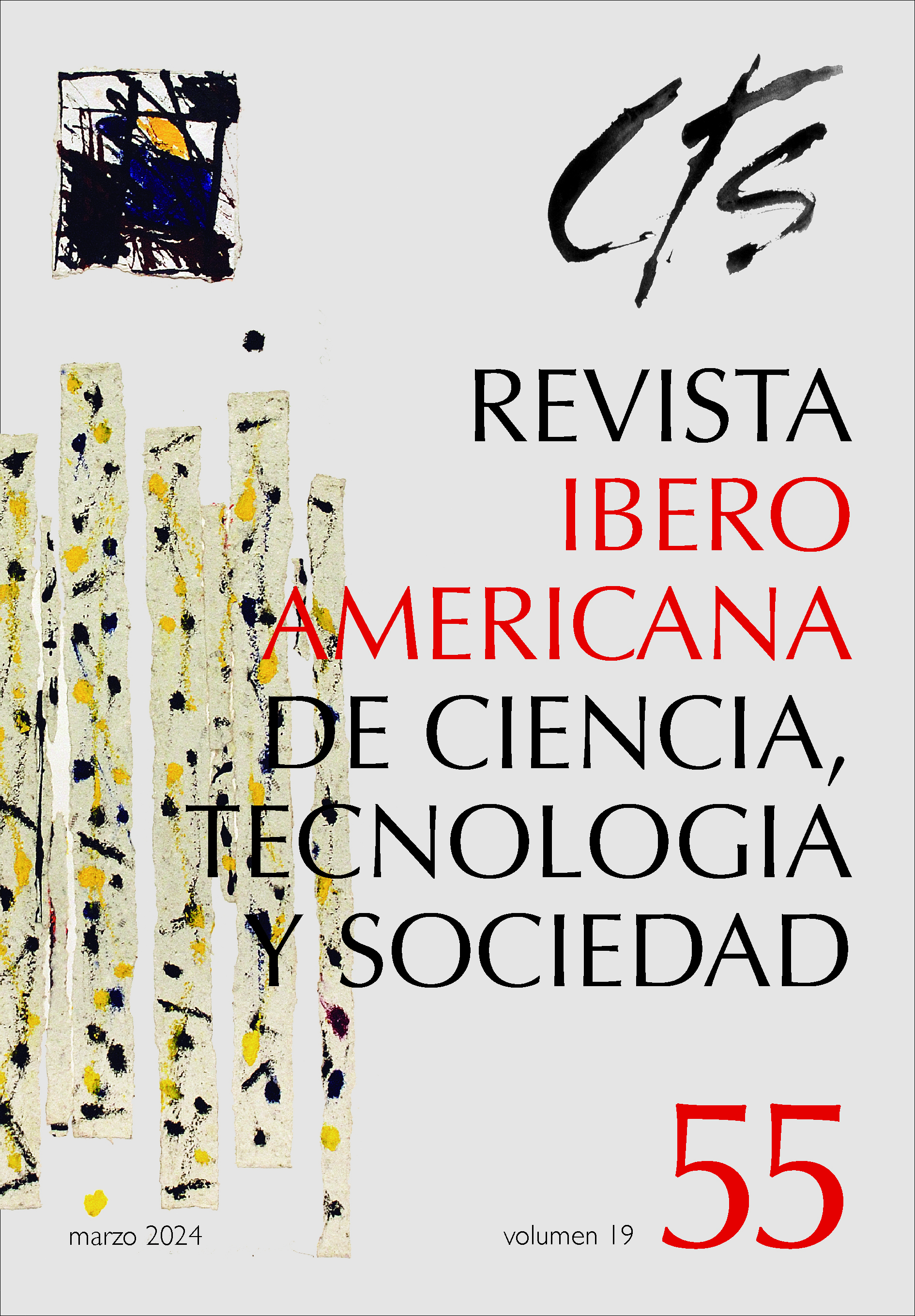Making a Place in Neuroscience with an Unconventional Animal
On the Relationship between the Local and the Global in Science and Technology Studies
DOI:
https://doi.org/10.52712/issn.1850-0013-354Keywords:
local-global, neuroscience, etnographyAbstract
The relationship between local and global processes in the production and circulation of scientific knowledge has been discussed in the field of science and technology studies in Latin America since at least the 1980s. This article explores how it is configured and what is the weight of the local to understand the geopolitical and physical anchoring of Latin American scientific communities. Results obtained in an ethnographic analysis of an Argentine neuroscience laboratory are presented. This analysis examines what it meant for this group to make a place for themselves in neuroscience as they do research with unconventional animals. Therefore, it is shown how the proceedings in the research with these animals allowed the group to insert itself, with a perspective in which local and global aspects converged, in the international stream of science. It is concluded that the importance of highlighting the weight of the local in the understanding of Latin American scientific communities derives from the fact that they cannot look outside if they do not have a place from which to look and do science.
Downloads
References
Albornoz, M. & Gordon, A. (2011). La política de ciencia y tecnología en Argentina desde la recuperación de la democracia (1983-2009). En M. Albornoz & J. Sebastián (Eds.), Trayectorias de Las Políticas Científicas y Universitarias de Argentina y España (1–46). Madrid: CSIC.
Carnota, R. (2014). Cuando las encuestas fueron terrorismo intelectual. La Ménsula, 8(20).
Chauca, R. & Ragas, J. (2021). Presentación del dossier "Ciencia, conocimiento y sociedad". ÍCONOS Revista de Ciencias Sociales, 25(71), 7-12.
Cieraard, I. (2018). Home. The International Encyclopedia of Anthropology. Hoboken: John Wiley & Sons.
Cueto, M. (1989). Excelencia científica en la periferia: actividades científicas e investigación biomédica en el Perú. Lima: GRADE Group for the Analysis of Development.
Dagnino, R. & Thomas, H. (1999). La Política Científica y Tecnológica en América Latina: nuevos escenarios y el papel de la comunidad de investigación. Redes, 6(13), 1–20.
De Greiff, A. (2002). Entre lo local y lo global: ¿cuál comunidad científica? Revista Trans, 118-133.
Ferroni, L. (2018). Neurobiólogos-recolectores: rituales y saberes en la pesca de cangrejos. Avá - Revista de Antropología, 31, 227-249. Recuperado de: https://www.redalyc.org/journal/1690/169057622011/html/.
Ferroni, L. (2020). El desmembramiento de la tribu de los Maldonado. Etnografía de un laboratorio de neurocientíficos argentinos [Tesis de doctorado]. San Martín: Universidad Nacional de San Martín.
Ferroni, L. (2022). De “todero” a “cangrejero”: dinámicas de co-producción en la constitución de un modo de hacer neurociencias. Redes, 28.
Franklin, S. (1995). Science as Culture, Cultures of Science. Annual Review of Anthropology, 24, 163-184.
Guber, R. (2013). La articulación etnográfica. Descubrimiento y trabajo de campo en la investigación de Esther Hermitte. Buenos Aires: Biblos.
Gupta, A. & Ferguson, J. (2008). Más allá de la ‘cultura’: espacio, identidad y las políticas de la diferencia. Antípoda, 7, 233-256.
Hess, D. (2001). Ethnography and the Development of Science and technology Studies. En A. Coffey, S. Delamont, J. Lofland & L. Lofland (Eds.), Sage Handbook of Ethnography (234-245). Thousand Oaks: Sage.
Kleiche-dray, M., Kervran, D. & Quet, M. (2019). Going South. How could STS think science in and with the South? Tapuya Latin American Science, Technology and Society 2, 1(1), 280–305.
Knorr Cetina, K. (2005). La fabricación del conocimiento. Un ensayo sobre el carácter constructivista y contextual de la ciencia. Bernal: Editorial de la Universidad Nacional de Quilmes.
Kreimer, P. (2010). Ciencia y periferia. Nacimiento, muerte y resurrección de la biología molecular en la Argentina. Buenos Aires: Eudeba.
Latour, B. & Woolgar, S. (1995). La vida en el laboratorio. La construcción de los hechos científicos. Madrid: Alianza.
Livingstone, D. (2007). Science, site and speech: Scientific knowledge and the spaces of rhetoric. History of the Human Sciences, 20(2), 71–98.
Massey, D. (2012). Imaginar la globalización: las geometrías del poder del tiempo-espacio. En A. Albet & N. Benach (Eds.), Doreen Massey. Un sentido global del lugar (130-155). Barcelona: Icaria.
Matharan, G. (2016). La dinámica centro–periferia en el estudio de la ciencia en América Latina: notas para una reflexión historiográfica sobre la Argentina. El hilo de la fábula. Revista anual del Centro de Estudios Comparados, 16, 33-47.
Segalen, M. (2005). Ritos y rituales contemporáneos. Madrid: Alianza Editorial.
Spivak L’Hoste, A. & Hubert, M. (2012). Movilidad científica y reflexividad. De cómo los desplazamientos de los investigadores modelan modos de producir conocimientos. Redes, 18, 85-111.
Taussig, M. (1993). Mimesis and Alterity: a particular history of the senses. Nueva York & Londres: Routledge.
Turnbull, D. (1997). Reframing science and other local knowledge traditions. Futures, 9(6), 51–562.
Vessuri, H. (1986). De la transferencia a la creatividad. Los papeles culturales de la ciencia en los países subdesarrollados. Oiartzun: Saldaña.
Vessuri, H. (2007). O inventamos o erramos: La ciencia como idea-fuerza en América Latina. Bernal: Editorial de la Universidad Nacional de Quilmes.
Vinck, D. & Zarama, G. (2007). La fusion de laboratoires. Revue d'anthropologie des connaissances, 1(2), 267-296.
Downloads
Published
How to Cite
Issue
Section
License
Copyright (c) 2022 CC Attribution 4.0

This work is licensed under a Creative Commons Attribution 4.0 International License.
All CTS's issues and academic articles are under a CC-BY license.
Since 2007, CTS has provided open and free access to all its contents, including the complete archive of its quarterly edition and the different products presented in its electronic platform. This decision is based on the belief that offering free access to published materials helps to build a greater and better exchange of knowledge.
In turn, for the quarterly edition, CTS allows institutional and thematic repositories, as well as personal web pages, to self-archive articles in their post-print or editorial version, immediately after the publication of the final version of each issue and under the condition that a link to the original source will be incorporated into the self-archive.











